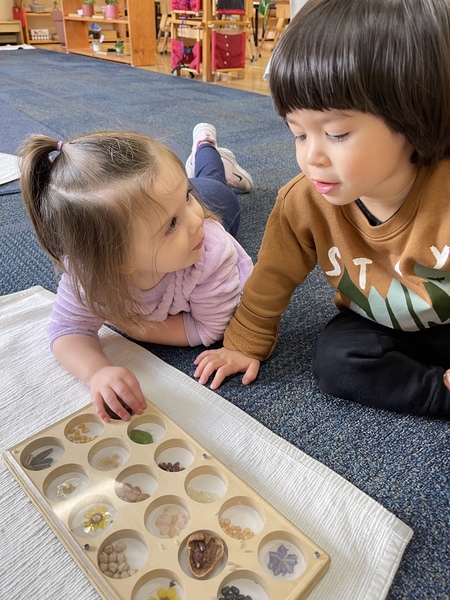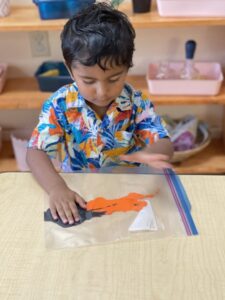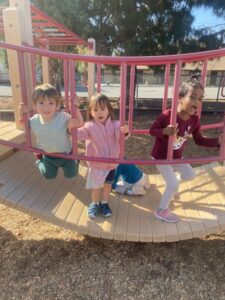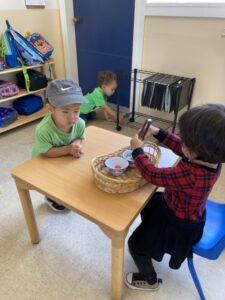
By Colleen Noll
Maria Montessori revolutionized childcare and early education with her ideas on how to best help children learn and grow. She developed her approach to early childhood education in the early 20th century, and since that time, the Montessori approach has continued to grow in popularity around the world. If you’re considering the Montessori approach for your 2-year-old, you are making a good choice.
What makes the Montessori method so effective is that it is designed in recognition of the sensitive periods every child goes through as part of their natural development. The sensitive periods are critical periods of development during which children can acquire certain abilities and learn certain things with more ease and facility than they ever will again.
At the Montessori School of Silicon Valley (MSOSV) the community for 2-year old’s is called Pre Primary.
The Pre Primary (PP) years are also defined by independence. PP’s love to explore, try new things, and imitate the activities they see around them. PP’s can get very frustrated when they can’t do things for themselves. This is also the age where “no” becomes a big part of many children’s vocabularies. In the Montessori PP environment, the daily schedule and program is specifically planned and followed through to assist the children to develop self-confidence, self-direction, and discovering their own personal preferences and passions.
At this age, PP age children aren’t necessarily “social” in the way we would describe adults. Instead, children are developing the building blocks of socialization. They are learning basic social cues; they can look at the person who is speaking and can smile in reaction to things (usually parents and caregivers).

In the PP environment, the children come to prefer the “real” work of the classroom community. Working together to set the table for lunch, washing the dishes after a meal and folding the laundry. While working together the children attain real skills that allow them to participate more fully in life at home as well as at school.
PP age children communicate their needs through movement. When they move, they learn to coordinate the many moving parts of their bodies. The more they can move the better they learn to control their body. The PP classroom is rich in movement, allowing ample space and carefully prepared curriculum to allow the PP child to develop using their body with large and small gross motor activity.
All of this is done at a pace that meets each individual child’s needs and matches the natural rhythm of their development. Instead of creating a generic learning plan for the classroom, each PP child is given the individualized attention they need when they need it.
After all, our goal is to nurture every child so they can achieve their fullest potential. And we can only do that by responding to each of their unique needs.
PP children quickly acquire lots of new skills, and one of the most impressive is language. Vocabulary and verbal abilities are exploding at this age. They go from single words to simple sentences and sounding out a few one-syllable words to carrying on full conversations with their friends and caregivers.
This is the perfect time to encourage language skills and acquisition. It lays the foundation for reading. The MSOSV Primary language program picks right up where the PP classroom leaves off, with most of the Montessori children at MSOSV reading by age four and enabling our 3rd Year’s (Kinders) to begin writing their own stories.
Along with such practical lessons as cleaning and sweeping, the children in a Montessori community learn pro-social behaviors. The exercises of Grace and Courtesy, as the names imply, help children control their bodies and move more gracefully while giving them the courtesies of social life, the “pleases” and “thank you’s”. Practical life skills we all need.
PP children are endlessly fascinated by the world around them, and this is the age when children start to really develop their noticing skills. They’ll start paying attention to tiny details and start refining all their senses. They’ll get better at discerning shades of color, tones and sounds, and tastes and textures.

These are the foundations for precise visual discrimination, developing a great ear for music, and a good palate. The MSOSV PP environment has many activities that encourage sensory development, including music, art, and food tasting.
With the Montessori method, it’s never to soon to start learning. Giving 2-year old’s a Montessori education is a great way to set them up for all that will come when they become Primary/Kindergarten students.
It’s also a great way to foster a lasting love of learning and to equip them with some of the core abilities they’ll need throughout their lives, like reading and communication, confidence and self-direction.
Book a tour today and then speak to the Head of School about bringing your 2-year-old in for a visit.